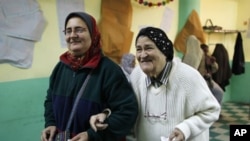Voting in Egypt's first parliamentary elections since the ouster of former president Hosni Mubarak continued after monitors reported high turnout and a peaceful atmosphere the previous day.
Tuesday marks the second day in a drawn-out voting process staggered over the next six weeks across 27 provinces.
The influential Muslim Brotherhood, a moderate Islamist movement banned since the 1950s, is expected to emerge as the largest power - but without an outright majority - when results are published in January.
The historic election will determine whether the group's Freedom and Justice Party is poised to move Egypt down a more Islamist path after nearly six decades as an authoritarian secular state effectively run by the military.
All day Monday, massive crowds turned up at polling stations despite security concerns and turmoil over a deadly spate of violence in the week before the polls opened. Many voters said they were casting ballots for the first time, while others expressed hope that this election, unlike those of decades past, will count.
Photo Gallery: Egyptians Cast Their Ballots
The first day of polling was extended for two hours in some locations.
The main cities of Cairo and Alexandria, as well as seven other provinces, are currently voting. A runoff for those areas will be held December 5.
The rest of the country will vote in two later rounds expected to conclude in early January. Elections for the upper house will then take place, ending in March, after which the assembly will write a new constitution.
Thousands of Egyptian judges are monitoring the process.
Egypt's ruling generals have established a convoluted electoral system that many fear will result in a legislature lacking credibility. Army generals have made clear the new assembly would have no right to remove a government appointed by the ruling military council.
Nine days of widespread clashes, with 42 people killed and more than 3,000 injured, have heightened fears of violence among supporters of rival candidates.
Some information for this report was provided by AP and AFP.
| Join the conversation on our social journalism site - Middle East Voices. Follow our Middle East reports on Twitter and discuss them on our Facebook page. |














